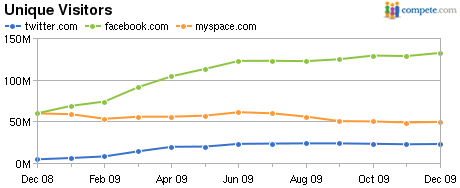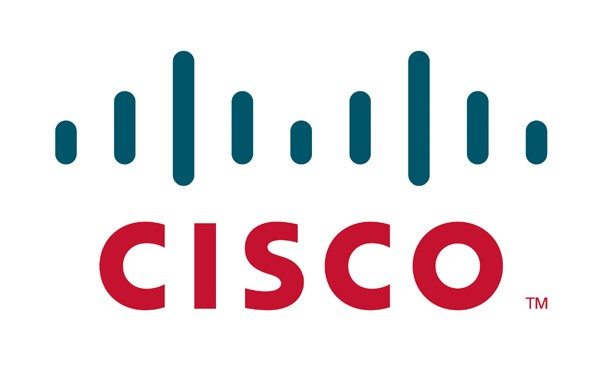
It's been a while since I did a numbers post on social media, but it's time for an update and there's a great supplement in this week’s Economist discussing all things social networking.
It's well worth reading the whole 20-page report but, if you don’t have time, here are the stats (always useful).
Social Audiences
- Facebook is the globe’s largest online social network with over 350 million users.
- Facebook’s audience is bigger than any TV network that has ever existed on Earth.
- Were it a nation, Facebook would be the world’s third most populous after China and India.
- 70% of its audience is outside the United States.
- Twitter had 58 million web visitors in October 2009 ... or is it 23 million? See end of this entry.
- Facebook took almost five years to get its first 150m users, but just eight months to double that number.
- LinkedIn has over 58 million members, and it took 16 months to reach its first million users whereas the most recent additional million came on board in only 11 days.
Mobile Social
- eMarketer estimate that over 600 million people will use their
phones to tap into social networks by 2013, a more-than-fourfold
increase on last year’s 140 million. - Facebook has 65 million mobile users.
Social Content
- Facebook’s users post over 55 million updates a day and share more
than 3.5 billion pieces of content with one another every week. - Over 2.5 billion photos a month are uploaded to Facebook, making it one of the largest photo-sharing sites on the web.
- Facebook has one engineer for every 1.2 million users.
- Facebook has over 1 million developers creating software for it and its online directory contains over 500,000 apps.
- Twitter has spawned over 50,000 apps, including offerings from
firms such as Twitpic, which lets people post photos to their Twitter
feeds, and Twitscoop, which highlights popular topics being talked
about on the service at any moment.
Social Revenues
- Facebook does not reveal numbers, but its revenues last year are
thought to have been at least $500m and quite possibly more, which
helped it to turn cash-flow positive in mid-2009. - Although user numbers were sharply up last year, the
social-networking industry’s revenues in America, its biggest
advertising market, rose only by a modest 4% to $1.2 billion according
to eMarketer, a market-research firm. - That was still an achievement, because the total online advertising
market shrank in 2009 and MySpace revenues, the largest share, are
thought to have fallen last year. - This year eMarketer expects revenues to grow by over 7%.
- ComScore found that one in five adverts viewed by American web
users last June ran on social-networking sites, with MySpace still
accounting for the biggest chunk of the total.
Social Games
- In 2008 Tencent, the Chinese ‘Facebook’ which runs QQ coins, listed on the Hong Kong Stock Exchange and reported revenues of just over $1 billion, with $720m coming from online gaming and sales of items such as digital swords and other virtual goods.
- Ning, another social networking tool, is targeting gifts rather than games and launched an initiative in October 2009 that allows people to sell customised digital items to their members. These cost anything from 50 cents to $10, and over 400,000 are being exchanged every month, splitting the profit equally with its customers.
- In the game “Sorority Life”, users complained about the lack of virtual men to date so Playdom quickly introduced some last November – some 10 million of the boyfriends were promptly snapped up with a few players buying as many as 500 boyfriends each; some paid for their digital darlings with virtual credits won in the game, but others stumped up over $5 a time for their beaux.
- Although Asia remains by far the biggest market for digital knick-knacks, Inside Network, a research firm, has estimated that sales of virtual wares in America on many different kinds of websites reached $1 billion last year and could grow to $1.6 billion in 2010.
- ThinkEquity, an investment bank, reckons that revenues in America from social games could hit $2.2 billion by 2012, a big leap from last year’s $375m million.
- “The best virtual goods have real currency,” says Mark Pincus who runs Zynga, on eof the biggest gaming firms on Facebook.
Social Marketing
- A survey of 1,000 heavy users of social networks and other digital media conducted in August 2009 by Razorfish, found that 44% of those following brands on Twitter said they did so because of the exclusive deals the firms offered to users.
- One in five tweets mention specific brand names in the updates.
- O2 found that 17% of Britain’s small businesses were using Twitter to attract new customers and some believe they have saved around £5,000 ($8,000) a year from other forms of marketing by doing so.
Social Hiring
- US Cellular, a telecoms company, says it saved over $1m last year by using a LinkedIn system that produced good candidates for its jobs faster than traditional recruitment channels.
- A survey by CareerBuilder.com of about 2,700 executives in America last year found that 45% of them looked at job candidates’ social-network pages as part of their research, and more than a third of those had unearthed information there that put them off hiring someone.
Social Not-working
- A survey of 500 small businesses in America conducted by Citibank last October found that most of them had not used online networks at all because they thought they would be a waste of time.
- Morse estimate that personal use of social networks during the working day was costing the British economy almost £1.4 billion ($2.3 billion) a year in lost productivity.
- Nucleus Research, an American firm, concluded that if companies banned employees from using Facebook while at work, their productivity would improve by 1.5%.
- A survey of 1,400 CIOs by Robert Half Technology last year found that only 1/10th gave employees full access to networks during the day, and many were blocking Facebook and Twitter altogether.
If you like this sort of thing, then please join our survey on social media in finance.
Click to take the survey: https://www.surveymonkey.com/s/NXWW2B3
The survey is closing very soon, so feel free to join the 425 professionals from banks, corporations, consultancies, governments and the professions who have responded so far. Results published at the end of the month.
Meanwhile, if you like this sort of thing a lot, then here’s a few more social media numbers, this time from this year’s World Economic Forum (WEF):
- WEF reached a worldwide audience of 430 million readers online through the use of social networks this year.
- Facebook ran real-time pulses, polling over 200,000 people and bringing their views into the discussions.
- WEF has over 6,300 fans on Facebook.
- Webcasts of public sessions on Livestream reaching a cumulated audience of over 210,000 viewers.
- News conferences were seen by over 70,000 people, and they could put questions to panellists via Twitter and Facebook.
- Over 250 participants and 120 journalists continuously sharing their impressions on Twitter
- A Twitterwall allowed participants to see a running micro-commentary on the meeting as it progressed.
- ‘Davos’, ‘WEF’ and ‘WorldEconomicForum’ were mentioned 30,000 times on Twitter.
- 1,551,130 people are following the Forum on Twitter (http://twitter.com/davos)
- The Davos Debates on YouTube (http://www.youtube.com/davos) have been watched over 600,000 times.
UPDATE: I ran a competition related to this entry asking folks to say how many visitors went to twitter in October 2009. The Economist had the figure 58 million but the winning entry sent me this from Usuable NZ:

In October 2009, unique visitors numbers were:
- Facebook = 128,940,004 (+188.67% from 1 year ago)
- Myspace = 49,903,567 (-9.18% from 1 year ago)
- Twitter = 23,042,455 (+577.92% from 1 year ago)
Lies, darned lies and statistics!!
The Financial Services Club is sponsored by:

For details of sponsorship email us.
Chris M Skinner
Chris Skinner is best known as an independent commentator on the financial markets through his blog, TheFinanser.com, as author of the bestselling book Digital Bank, and Chair of the European networking forum the Financial Services Club. He has been voted one of the most influential people in banking by The Financial Brand (as well as one of the best blogs), a FinTech Titan (Next Bank), one of the Fintech Leaders you need to follow (City AM, Deluxe and Jax Finance), as well as one of the Top 40 most influential people in financial technology by the Wall Street Journal's Financial News. To learn more click here...

